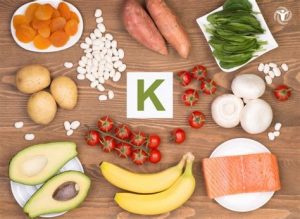Our previous blog has generated numerous questions regarding Vit K, so much so, I feel it necessary to share more about this topic. There are actually two types of Vitamin K that are critical for good health: Vitamin K1 (phylloquinone) comes from green leafy vegetables. Vitamin K2 (menaquinones or MKs) comes from meat, eggs, and fermented foods.

Vitamin K1 travels to liver more effectively than to bones. The Liver uses Vitamin K1 to activate proteins needed for blood clotting.
Vitamin K2 travels to bone more effectively than K1. Bones use K2 to produce Osteocalcin, a bone-building protein hormone, which also supports metabolic health. Vitamin K2 also increases the production of Adenosine triphosphate, the compound that provides energy to living cells.
Because of this overlapping and symbiotic nature of the two vitamin Ks, it’s beneficial to include foods that provide both types in one’s diet. For the same reasons, a quality Vitamin K supplement should provide both K1 and K2.
While Vitamin K is crucial for blood clotting and aids in wound healing according to the Danish researchers its role in lung health has also been realized. As was stated in our previous blog, the study was published in European Respiratory Journal – Open Research in July 2023.
Currently researchers aren’t suggesting a modification to the existing guidance on Vitamin K consumption; however, they note that the findings do bolster the case for additional research into the potential benefits of Vitamin K supplements.
Prior to lung study, Vitamin K was previously shown to improve Covid outcome.
A study published in Frontiers in Nutrition in January 2022 found that Vitamin K was a critical nutrient in the battle against Covid-19. According to researchers, Vitamin K was an important modulator of the Covid “cytokine storm.” A cytokine storm is a physiological reaction in humans and other animals in which the innate immune system causes an uncontrolled and excessive release of pro-inflammatory signaling molecules called cytokines.
This study was conducted by scientists at Copenhagen University Hospital and the University of Copenhagen. The trial included over 4,000 participants ranging in age from 24 to 77. To accumulate the data, study participants underwent a lung function test called spirometry, contributed blood samples, and provided insights on their health and lifestyle through questionnaires.
One specific blood test marker, dp-ucMGP, was used to identify low levels of Vitamin K. Spirometry gauges the volume of air one can exhale in a second (known as forced expiratory volume or FEV1) and the maximum volume inhaled during one breath, termed forced vital capacity (FVC).
The research revealed a correlation between deficient Vitamin K markers and reduced FEV1 and FVC values. Participants with decreased Vitamin K levels were also more likely to report COPD, asthma, or wheezing incidents.
“We already know that Vitamin K has an important role in the blood and research is beginning to show that it’s also important in heart and bone health, but there’s been very little research looking at Vitamin K and the lungs. To our knowledge, this is the first study on Vitamin K and lung function in a large general population. Our results suggest that Vitamin K could play a part in keeping our lungs healthy,” says Dr. Torkil Jespersen in a media release.
Additional heart health benefit
Though many studies document a link between heart health, bone health and Vitamin K, the Denmark team plans to build on the established research by integrating respiratory health along with the other benefits.
A 2018 study tracking 33,000 people found that increased intake of Vitamin K2 reduced the risk of mortality from coronary heart disease. Researchers used the European Prospective Investigation into Cancer and Nutrition cohort to compile their data.
Meanwhile, a more recent 2021 Australian study found that a diet rich in Vitamin K can lower the risk of heart disease due to atherosclerosis by over 30 percent.
To come to their conclusions, the researchers tracked 50,000 people taking part in the Danish Diet, Cancer, and Health study for a period 23 years. This then is no small study lending to the credibility of the results!
What does all this mean? It means that we need to add the foods listed in this and the previous blog to our grocery list, or to supplement with a K1K2 combo obtained from a trusted source if you’re one wanting to enjoy “the best performance of your life!”
God bless,
DrB
Sources: ERJ Open Research, EPIC.iarc, University of Copenhagen.



